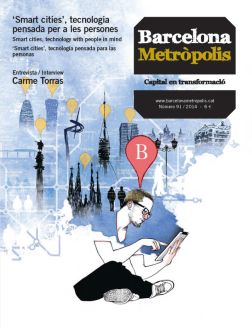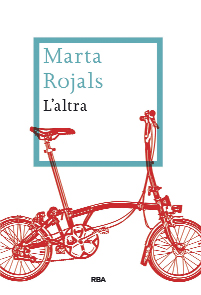[The other (Outstretched wings)]
- Marta Rojals
- Edicions de la Magrana (RBA)
- Barcelona, 2014
- 336 pages
One of the ways to read the new novel by the author from Palma d’Ebre, Marta Rojals, is to look at the “other Barcelona” that eyes from the extreme south-west of the region see. At least two neighbourhoods are pinpointed: the squares of Gràcia full to bursting with unemployed young people who kill time in the mornings by having coffee or drinking beer, and a more well-to-do Sant Gervasi but where design studios are in a downward spiral or are in the process of reconverting to nothingness. All around there are locals who do not know how to speak Catalan without 25% of the words being in Spanish: Rojals’ ear is fine-tuned and this is demonstrated in the dialogues, full of these barbarisms, and the fact that the protagonist, who is dangerously close to being 40, is hung up on a boy who is just over 20 because of his above-average level of Catalan. The city – and here it need not be Barcelona, as the same would happen in any large metropolis – plays another role, that of bringing together while at the same time isolating a large number of individuals. The two splendid opening pages of the novel talk about the screens that every night light up every window in every block of flats as if they were glow-worms searching for each other, coming together, exchanging information then retreating, in a 2.0 version of “me in my house and you in yours”: separated but united by our daily wireless connection.
L’altra can be summed up in a few lines: a couple who have been together for year become destabilised on several fronts. He loses his job, a sister invites herself to live in the house, and she loses her head over a young skateboarder who makes her question a lot of stuff. With a premise so close to cliché, the delicate job of the writer is not to fall, misunderstood, over the cliff of women’s literature, that of “feelings”: what helps is a certain hardness found in many people from the Terres de l’Ebre, but more than this is the utmost seriousness with which she confronts the writing.
There are no plot digressions, no surplus characters, no action or detail that does not have a dramatic function. It is a steel framework with a surprise ending that, far from being pulled out of her sleeve, is the only possible explanation for the extremely perfectionist and neurotic character of Anna, the physicist-cum-designer who is the second major female character that the author has given us after Èlia from Primavera, estiu, etcètera. If Èlia digested her separation and retreated to the village to, in some way, kill her father, Anna, besides facing the loss of desire implied in the routine of a couple, hides a secret that forces her to make a more psychoanalytical descent into hell, after which, inevitably, she finds her mother. This demonstrates that the two characters have contradictions and layers of depth, and it brings them so close to the reality of the reader that they can almost feel their breath on the back of their neck.
Orbiting around them are well-defined secondary characters, like Cati, Anna’s boss, the typical result of the accelerated Barcelona of the eighties and early nineties, and Nel, the good guy who years ago put up a wall around the beast that Anna now has inside her, and who has a curious feature, a prosthesis in a sensitive part of his anatomy. Or maybe it is not so strange, because it turns out the young skateboarder has prosthesis – in his ear, because he is deaf – and maybe the person with the most evident prosthesis, in her pocket, is Anna herself. Mobile phone, tablet and computer screens, instant messaging: all these mechanisms flood our lives to saturation point with often deficient and incomplete communication. They also fill up the pages of L’altra depicting people disoriented and bewildered by the crisis so that they cling to these gadgets like a red-hot poker: their eyes bloodshot because of a DM [direct private message on Twitter], sleeplessly waiting for a WhatsApp icon. Life and literature, side-by-side on the screen.




